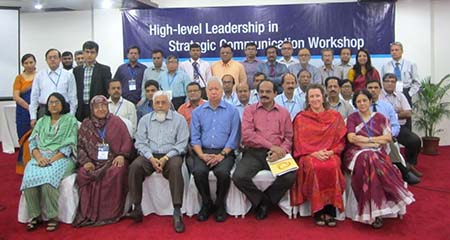The Bangladesh Knowledge Management Initiative (BKMI)
 The Bangladesh Knowledge Management Initiative (BKMI) strengthens the capacity of the Government of Bangladesh (GoB), USAID implementing partners and other stakeholders to develop strong, consistent, and effective Social and Behavior Change Communication (SBCC) campaigns and interventions to improve the health and well-being of the people of Bangladesh.
The Bangladesh Knowledge Management Initiative (BKMI) strengthens the capacity of the Government of Bangladesh (GoB), USAID implementing partners and other stakeholders to develop strong, consistent, and effective Social and Behavior Change Communication (SBCC) campaigns and interventions to improve the health and well-being of the people of Bangladesh.
In addition, BKMI facilitates coordination around SBCC within the Ministry of Health and Family Welfare (MoHFW) and with other stakeholders, and supports the multi-sectoral BCC Working Group as a forum for coordination, networking and learning.
An overall capacity strengthening strategy is to introduce appropriate information and communication technology (ICT) tools for SBCC and Knowledge Management.
Key activities include:
- Providing technical assistance on the design, implementation, management and evaluation of strategic, evidence-based SBCC interventions by working directly with Bureau of Health Education (BHE), Directorate General of Health Services (DGHS); Information, Education, Motivation (IEM), Directorate General of Family Planning; and Institute of Public Health Nutrition (IPHN), DGHS.
- Strengthening capacity at the individual level by increasing knowledge and building skills on SBCC; at the organizational level by introducing tools and processes to support effective SBCC; and at the system level by promoting strategic, coordinated SBCC by all stakeholders.
- Developing digital archives forfor BHE, IEM and IPHN Units; eLearning courses for Program Managers and Field Workers; an eToolkit for Program Managers; an eToolkit for Field Workers; and a website for BHE.
- Coordinating the BCC Working Group, a forum for discussing and sharing best practices for SBCC on Health, Population and Nutrition (HPN) in Bangladesh. This working group encourages coordination, networking and capacity development, and facilitates cross-promotion of messages.
BKMI is a three-year USAID-funded project under the global Health Communication Capacity Collaborative (HC3), implemented in collaboration with the Bangladesh Center for Communication Programs (BCCP).
Accomplishments:
- Coordinated the development of the Comprehensive National SBCC Strategy by MoHFW, NGO and development partner stakeholders. The Strategy will provide a high-level, theory-based and evidence-based vision for SBCC for the MoHFW.
- Shared Best Practices for SBCC in Bangladesh via a Share Fair event called Safollo Gatha (Success Stories).
- Developed two eLearning Courses for SBCC Program Managers: Monitoring and Evaluation for SBCC, and Message and Materials Development.
- Updated eLearning courses for Field Workers: Family Planning 1 & 2; Maternal, Neonatal and Child Health 1 & 2; Breastfeeding; Complementary Feeding; Integrated Messaging; and Interpersonal Communication and Counseling.
- Updated the eToolkit for Field Workers; it is available online, offline and as an Android app.
- Disseminated 600 copies of a compiled set of 4 DVDs of SBCC videos that were produced by the three Units.
- Updated four Nijeke Jano (Know Yourself) Adolescent Sexual and Reproductive Health (ASRH) booklets.
- Delivered workshops on Campaign Design; Leadership in Strategic Communication; Strategic Communication for Public Health; Knowledge Management; and Using ICT for SBCC.
- Completed an SBCC Mapping and Situation Analysis for USAID Bangladesh.
- Field tested a monitoring checklist for SBCC activities at the grassroots level.
- Obtained MoHFW approval of the National Framework for Effective HPN SBCC.
- Strengthened the Information, Education, and Communication (IEC) Technical Committee, the government body that approves all SBCC materials, by standardizing review criteria and providing training.
